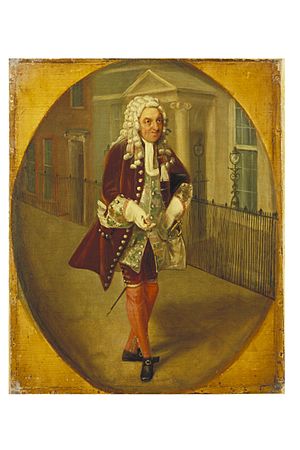Richard "Dicky" Suett facts for kids
Quick facts for kids
Richard Suett
|
|
|---|---|
 |
|
| Born | 1755 |
| Died | 6 July 1805, age 50 |
| Nationality | English |
| Other names | Dicky |
| Occupation | Actor |
| Known for | Actor, comedian |
Richard "Dicky" Suett (1755 – 6 July 1805) was an English comedian. He was a favorite Shakespearean clown of King George III. Suett was a star actor at the Theatre Royal, Drury Lane for twenty-five years.
Contents
Who Was Richard Suett?
Richard Suett, also known as "Dicky," was a famous actor and comedian. He lived in England during the late 1700s and early 1800s. He was especially known for playing funny characters, often called clowns, in plays by William Shakespeare.
Early Life and Training
Richard Suett was born in Chelsea, London in 1755. When he was ten years old, he joined the choir at Westminster Abbey. There, he learned music from a teacher named Benjamin Cooke.
In 1769, he began singing at popular public gardens like Ranelagh Gardens and Marylebone Gardens. By 1770, he was acting in small parts at the Haymarket Theatre. In 1771, he played the original Cupid in a comic opera called 'Dido'.
Starting His Acting Career
After his early roles, another actor, Charles Bannister, helped Suett get a job with a theater company in York. This company was run by Tate Wilkinson. Suett worked with Wilkinson for nine years as a singer and comedian.
His first show with them was in Kingston upon Hull on November 22, 1771. He sang a popular song called 'Chloe's my myrtle and Jenny's my rose.' Wilkinson thought Suett was very talented and even called him his student.
Becoming a Star at Drury Lane
Richard Suett's big break came when he joined the Theatre Royal, Drury Lane in London. This was one of the most important theaters in England.
First Roles at Drury Lane
Suett first appeared at Drury Lane in October 1780. He played the character Ralph in a play called 'Maid of the Well.' He quickly made a great impression on the audience.
In December 1780, he played Moll Flagon in 'Lord of the Manor.' He also took on many other roles, including Tom in 'Divorce' and Piano in 'Carnival of Venice.' He played Squire Richard in The Provoked Husband and Waitwell in 'The Way of the World.'
Famous Shakespearean Roles
Suett became very well-known for his roles in William Shakespeare's plays. He often played the funny, silly characters known as clowns or jesters.
Some of his famous Shakespearean parts included:
- Clown in 'Measure for Measure'
- Polonius in 'Hamlet'
- Peter in 'Romeo and Juliet'
- Dogberry in 'Much Ado About Nothing'
- Trinculo in 'The Tempest'
- Sir Andrew Aguecheek in 'Twelfth Night'
- Shallow in 'The Merry Wives of Windsor'
- Launcelot Gobbo in 'The Merchant of Venice'
- Touchstone in 'As You Like It'
- Pistol in 'Henry V'
He also played a Witch in 'Macbeth' and the First Gravedigger in 'Hamlet'.
Other Notable Performances
Besides Shakespeare, Suett played many other interesting characters. He was Filch in 'The Beggar's Opera' and Lord Froth in 'The Double Dealer.' He also played Sir Wilful Witwould in 'The Way of the World.'
He created many new characters in plays written during his time. These included Sir Ephraim Rupee in 'Liberty Hall' (1785) and Endless in 'No Song no Supper' (1790). He was also the first Yuseph in 'The Siege of Belgrade' (1791).
When Drury Lane was being rebuilt, Suett performed at the Haymarket Opera-house. He later returned to the newly opened Drury Lane in 1794. One of his most successful new roles was Jabal in 'The Jew' (1794).
Richard Suett's Reputation
Richard Suett was known for his unique acting style. He often used special makeup to change his appearance. He was also good at making funny faces and adding his own jokes to his lines.
What People Thought of His Acting
Many people admired Suett's performances. William Hazlitt, a famous writer, called him "the delightful old croaker." Another writer, O'Keeffe, said Suett was "the most natural actor of his time."
Leigh Hunt described Suett as "the very personification of weak whimsicality, with a laugh like a peal of giggles." This means he was great at playing funny, slightly odd characters.
John Philip Kemble, a famous actor and manager, especially liked Suett's role as Weazel in 'The Wheel of Fortune.' Kemble said that Suett could make him feel very strong emotions during their scenes together.
Later Life and Legacy
Richard Suett continued to act at Drury Lane until his death. He also performed at the Haymarket Theatre each summer until 1803.
Final Performances and Death
One of his last known roles was Lampedo in 'The Honeymoon' in June 1805. Richard Suett passed away on July 6, 1805, at the age of 50. He was buried in St. Paul's churchyard in London.
His son, Theophilus Suett, was also a musician. Richard Suett's acting style influenced later comedians like Charles Mathews.
Portraits
Several portraits of Richard Suett exist. The Garrick Club has three paintings of him by an artist named Dewilde. One shows him in regular clothes, and two show him in his famous acting costumes. One of these is as Endless from 'No Song no Supper.'
Another portrait by Dewilde, which was later made into an engraving, is kept at the National Art Library in South Kensington.
 | Sharif Bey |
 | Hale Woodruff |
 | Richmond Barthé |
 | Purvis Young |

